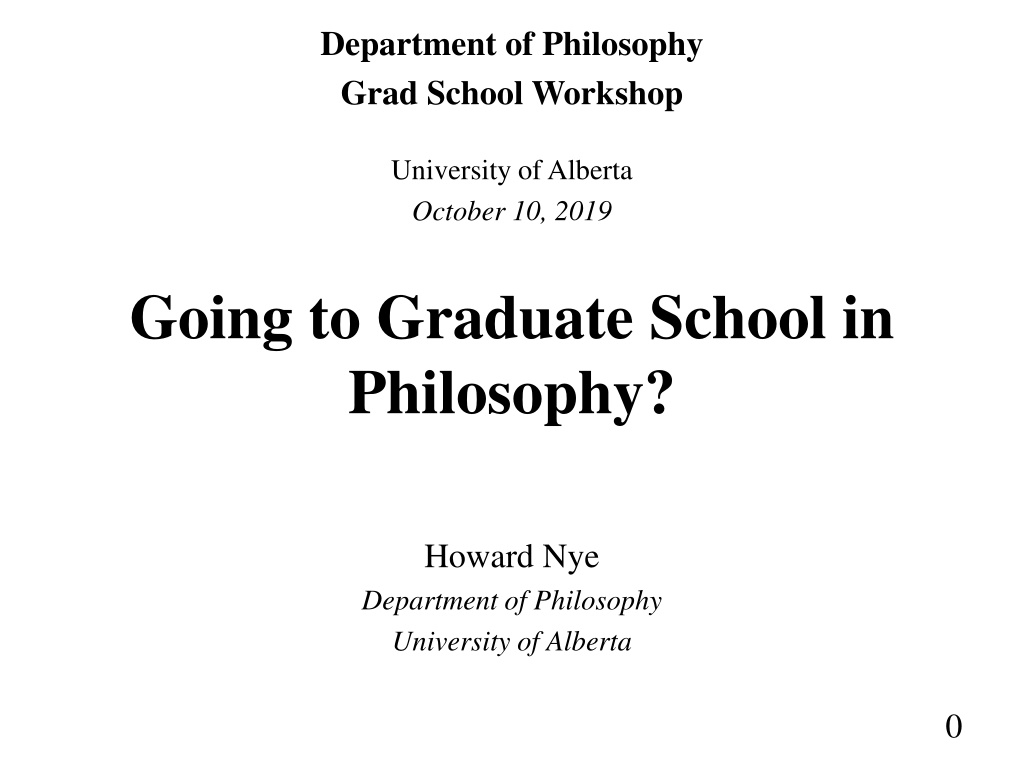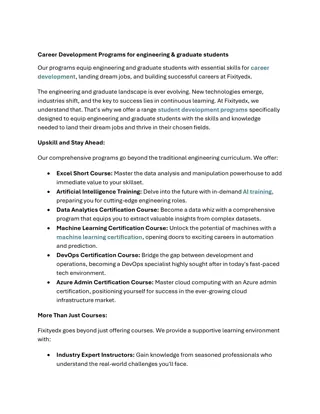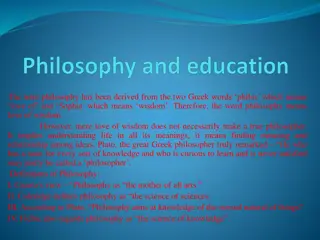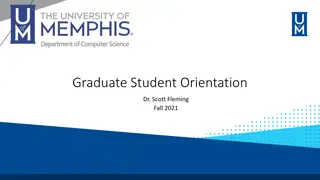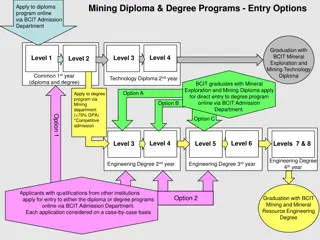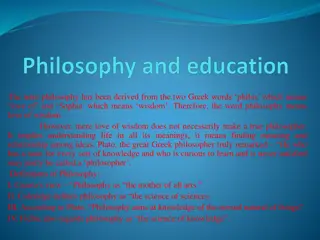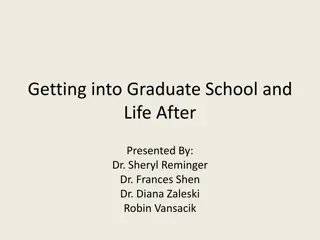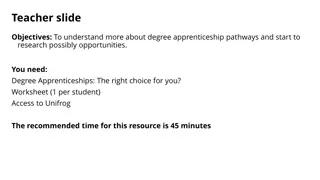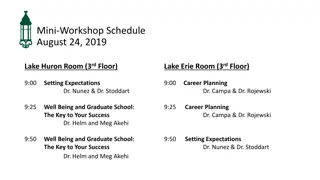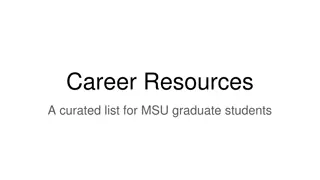Opportunities and Career Paths with a Graduate Degree in Philosophy
Pursuing a graduate degree in philosophy can lead to various career paths beyond academia, including roles in the government, law, ethics, editing, technology, and business. An MA in philosophy provides opportunities for skill development and exploration of philosophical ideas while keeping options open for further education.
Download Presentation

Please find below an Image/Link to download the presentation.
The content on the website is provided AS IS for your information and personal use only. It may not be sold, licensed, or shared on other websites without obtaining consent from the author. Download presentation by click this link. If you encounter any issues during the download, it is possible that the publisher has removed the file from their server.
E N D
Presentation Transcript
Department of Philosophy Grad School Workshop University of Alberta October 10, 2019 Going to Graduate School in Philosophy? Howard Nye Department of Philosophy University of Alberta 0
What Can I Do with a Graduate Degree in Philosophy? Pursue an academic career teaching and doing research at a post-secondary educational institution Note: this is not the only thing you can do! (more in a bit) Academic careers require a PhD; can apply straight from undergrad for PhD but likely best to first pursue an MA Very competitive job market, especially for tenure track jobs at research universities Need to be able to move to the location of the tenure track job Sessional teaching and teaching at high-teaching load institutions (e.g. community colleges) is more available and flexible, but much less secure and much less well compensated 1
What Can I Do with a Graduate Degree in Philosophy? Should only plan to pursue an academic career if you are highly motivated; aware of and willing to face the difficulties Nice thing about doing an MA first is that it helps you figure out whether you d like to pursue this track without the time commitment of a PhD An MA in philosophy also offers many opportunities outside of academia Much like the BA: can help with just about any job that requires problem analysis and problem solving, rigorous critical thinking, conceptual clarity, or ethical considerations & arguments 2
Opportunities Provided by the MA Particular careers for which a philosophy MA can be especially helpful Public sector / government: agencies, civil service, political staff Law and legal careers (including in conjunction with a law degree; cf. our own Beverley McLachlin) Work as an ethical authority in many public and private institutions such as hospitals, large firms, Advocacy groups, NGOs, think-tanks Editing, publishing, journalism Computers, technology, AI (esp. with logic background) Business, management, consulting 3
Opportunities Provided by the MA MA offers greater opportunity to develop skills at analytical reading, writing, argumentation, etc. With minimal commitment (most in Canada are funded, and 1-2 years) So it is a nice option for anyone interested in further exploring philosophical ideas and getting further training in philosophy While keeping options open, especially but certainly not only if one wants to explore the possibility of going on to pursue a PhD and possibly also an academic career Are there non-academic opportunities provided by the PhD beyond those provided by the MA? 4
Opportunities Provided by the PhD Thomas Mulligan (went from government to a PhD in philosophy): [A PhD in philosophy can be] a good financial investment. Whatever you end up doing, chances are you'll begin with a higher salary if you have a PhD rather than an MA. All subsequent raises are tied to that initial number and over time this can be significant: one study found that a $5k difference in initial salary works out to $600k+ over the course of a 40- year career. Second, the PhD will open up several classes of jobs to you that are usually unavailable to MAs; these include scholarly jobs at think tanks and other non-profits. Third, while I certainly don't think that education is just a matter of economic signaling, it is true that employers will regard the PhD as evidence that you are capable of independent and conscientious work on big projects. 5
Where Should I go to Pursue a Degree in Philosophy? For an MA: department s prestige is probably less important than for the PhD (but surely doesn t hurt) What may be most important is your fit with the department and its ability to develop your skills and ideas Either to help you get into a strong PhD program or pursue work outside of academia For the PhD: the academic job market is extremely competitive, and institutional prestige helps a lot Also from whom the letters of recommendation are coming Especially in countries with a high ratio of philosophers from western institutions to jobs for such philosophers 6
Where Should I go to Pursue a Degree in Philosophy? If pursuing a PhD with a non-academic career in mind, departmental prestige is likely less important Do your own research Look at rankings (Philosophical Gourmet Report) May take with a grain of salt for overall quality but they give helpful information about programs to consider, and how they are perceived by others Look at department webpages faculty profiles (active vs retired/emereti vs adjunct) graduate student profiles and past theses current research, publications, conferences Ask faculty here for advice If possible talk to current or former students 7
Where Should I go to Pursue a Degree in Philosophy? Fit is important! Get information about the specifics of the program requirements, course work, thesis MA or not, kind of thesis, length of program Get information about the city (cost of living, housing, transportation, services, quality of life, etc.) Are large or small departments more desirable? For the PhD & academic career path especially: more prestigious departments may tend to be larger Larger departments also offer more choices of seminars, more breadth, more activities, but less individual attention Smaller departments may offer more access to professors, smaller classes, close-knit grad community 8
Where Should I go to Pursue a Degree in Philosophy? but smaller departments may offer less breadth, and small communities might leave fewer options in case of difficulties Probably best to get more detailed information about the particular institutions in question Do not assume you will definitely end up working on topic X with individual Y Wherever you apply, make sure you have options! 9
What Affects My Chances of Being Accepted to a Program? Graduate programs look at an application package consisting of: your original university transcripts (especially your GPA in upper-level courses in philosophy or related fields), your writing sample (10-15 pp) your letters of reference (2-3) your statement of purpose some also require you to submit GREs all of these are expected to be strong sometimes, weaknesses in transcript can be explained Often best done by faculty in letters of recommendation, perhaps with some relevant (but non-defensive) background in statement of purpose 10
Is an Honours Degree Necessary to be Accepted into a Graduate Program? No, but it can be advantageous Letter from honours thesis supervisor who will better know you and your work (which helps) Also more opportunities to get strong letters from the professors teaching your additional 400 level classes Material for the honours thesis can serve as a basis for the writing sample Especially perhaps if you get a chance to develop and present some of this in the honours workshop! Other things that can strengthen your application doing more coursework (better GPA and letters) working on your writing sample Qualifying year 11
Your Writing Sample Don t go over the required length! Use your best and most suitable paper avoid purely exegetical paper Use something that shows your philosophical abilities Engages with relevant literature in a way that displays some original thinking ask professors for advice Even you best paper should not be sent as is ask for feedback, polish and refine sample should be uniformly good, clear, well-argued, and preferably up-to date Writing something new from scratch? 12
Your Letters of Reference Whom to ask? Someone who knows your work, who can speak to your progress, has read many of your papers, etc. Ask as early as you can Make sure you provide letter writers with all relevant information as soon as it is available: CV, draft statement of purpose, your work for them with comments A good letter is a specific letter! All else held equal it is better to ask more senior and established professors (vs. e.g. sessionals) Faculty from other disciplines can help if doing something interdisciplinary, but in general should ask philosophers Writers from different subfields can help show the breadth of your strengths 13
Your Statement of Purpose Schwitzgebel at Splintered Mind: I've never read a first draft of a statement of purpose that was any good. These things are hard to write, so give yourself plenty of time and seek the feedback of at least two of your letter writers. Plan to rewrite from scratch at least once. Avoid being poetic or corny E.g. don t say Ever since I was eight, I've pondered the deep questions of life, Philosophy is the queen of disciplines, delving to the heart of all, The Owl of Minerva has sung to me and the sage of K nigsberg whispers in my sleep: Not to philosophize is to die. Avoid sounding arrogant or grandiose 14
Your Statement of Purpose Don t aggressively sell yourself let your letter writers praise you be modest and be philosophically open remember that those reading your statement can come from a variety of backgrounds, and you want to learn form them Avoid telling the story of your life talk about your philosophical background and your philosophical interests show openness, breadth; it s good to appear knowledgeable but be factual, professional, and modest Tailoring statement for each school Can help to say whom you might like to work with, and why you re applying to the school - but don t overdo it 15
Graduate Record Examination [GRE] A computerized test of your preparedness to do graduate work offered by the US-based Educational Testing Service (ETS). Required by many US departments Verbal reasoning, quantitative reasoning, analytical writing costs: USD$ 205.00 Raising your scores do practice test learn GRE-specific strategies buy a GRE practice book if you have time and money, take a GRE prep class 16
Graduate Record Examination [GRE] Note: the GRE does not directly measure how intelligent you are or how good you are at philosophy It directly measures how good you are at taking the GRE, which can be significantly influenced by practice and developed technique at taking it Don t go in unprepared thinking: I m bright, I can do this! 17
How do I Pay for Grad School? Most PhD programs will offer you funding this is also true of MA programs in Canada (but not so much in the US) guaranteed funding through TAship and RAship admission scholarships, etc. external funding: SSHRC MA SSHRC applications must be submitted through the Research Portal by December 1 PhD SSHRC applications must be submitted from the department ot FGSR by October 28 Internal Departmental Deadline October 1 18
Applying to SSHRC for MA Funding For MA SSHRC Awards you submit: An outline of proposed research (one page max, plus one page for citations) CV (to be completed on the Canadian Common CV online system) Two letters of reference (to be uploaded online by referees before December 1st) Official and up-to-date transcripts from all postsecondary institutions attended, including University of Alberta transcripts (scanned and uploaded) 19
Applying to SSHRC for PhD Funding For Doctoral SSHRC Awards you submit: Program of Study (two pages, plus bibliography up to five pages) Research Contributions (one page maximum) Official Transcripts from all post-secondary institutions attended. If FGSR has the official up-to-date transcripts (ex. from time of admission), these transcripts do not need to be submitted again. FGSR generates a U of A transcript Two Letters of Appraisal Departmental Appraisal (to be submitted by your department) Consent to Disclosure of Personal Information Form. 20
The Project Proposal Provide a detailed description of your proposed research project for the period during which you will hold the award. Be as specific as possible Provide background information to position your proposed research within the context of the current knowledge in the field State the objectives and hypothesis, and outline the experimental or theoretical approach to be taken (citing literature pertinent to the proposal), and the methods and procedures to be used State the significance of the proposed research to a field or fields in the social sciences and/or humanities, as appropriate 21
The Project Proposal Note: If you have not yet decided on a specific project, you must still provide a detailed description of a research project that interests you You are not bound by this project You may change your research direction or activities during the course of the award. Expect to write many drafts! 22
SSHRC Evaluation Criteria Academic Excellence (50%) Academic record (first class average) Scholarships and awards held Duration of previous studies Type of program and courses pursued Course load Relative standing (if available) Research Potential (30%) Quality and originality of contributions to research and development Relevance of work experience and academic training to field of proposed research 23
SSHRC Evaluation Criteria Significance, feasibility and merit of proposed research Judgment and ability to think critically Ability to apply skills and knowledge Initiative, autonomy and independence Research experience and achievements relative to expectations of someone with the candidate s academic experience Personal Characteristics and Interpersonal Skills (20%) Work experience Leadership experience Project management including organizing conferences and meetings 24
SSHRC Evaluation Criteria The ability or potential to communicate theoretical, technical and/or scientific concepts clearly and logically in written and oral formats Involvement in academic life Volunteerism/community outreach 25
Resources Resources for applying for SSHRC funding https://www.ualberta.ca/graduate-studies/awards-and- funding/scholarships/tri-council-graduate-scholarships https://cloudfront.ualberta.ca/-/media/gradstudies/awards- and-funding/awards-documents/2018-cgsm-workshop- presentation.pdf https://cloudfront.ualberta.ca/-/media/gradstudies/awards- and-funding/awards-documents/2019-sshrc-doctoral- workshop-presentation.pdf Resources on Non-Academic Careers for Philosophers: https://cdn.ymaws.com/www.apaonline.org/resource/resmg r/docs/Beyond_Academia_2016.pdf 26
Resources https://www.gradschoolhub.com/faqs/what-types-of-jobs- are-available-with-a-masters-in-philosophy/ https://www.bestmastersdegrees.com/best-masters-degrees- faq/what-careers-are-available-with-a-masters-in- philosophy https://www.mastersdegree.net/masters-in-philosophy/ https://phil.ucalgary.ca/sites/phil.ucalgary.ca/files/what_to_ do_with_your_phd_in_philosophy.pdf https://study.com/articles/Job_Options_for_a_PhD_in_Phil osophy.html http://leiterreports.typepad.com/blog/2014/12/from-a-phd- in-philosophy-to-a-non-academic-career.html 27
Resources Other Helpful Resources http://www.ets.org/gre http://www.ets.org/gre/revised_general/prepare/ http://www.nserc-crsng.gc.ca/Students-Etudiants/PG- CS/CGSM-BESCM_eng.asp http://www.nserc-crsng.gc.ca/ResearchPortal- PortailDeRecherche/Instructions-Instructions/CGS_M- BESC_M_eng.asp http://schwitzsplinters.blogspot.ca/2007/10/applying-to- philosophy-phd-programs_08.html 28
